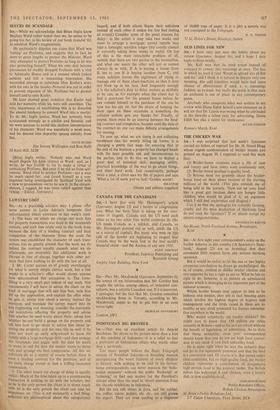SIR,—At first sight your correspondent's notes on the broiler industry
in this country ('A Spectator's Note- book,' August 23) are, so hysterical that they command little respect from any serious thinking spectator.
But it would be unfair to let the one or two highly erroneous conclusions he draws go unchallenged. He is, of course, entitled to dislike broiler chicken and one supposes he has a right to say so. What he has no right to do, however, is to present an unbalanced picture which is damaging to an important part of the national economy.
Whilst broiler houses may appear to him to be hideous and sinister, they are in fact housing units which involve the highest degree of hygiene and- management and the birds raised in them are as healthy as any stock presented for human consump- tion anywhere in the world.
Who would voluntarily cat broiler chicken? He might care to know that 150 million are eaten annually in Britain—and so far as I am aware without the benefit of legislation, or advertising. As to their diet being unhealthy, even your correspondent should know that you do not get high food conver- sion in any stock if you feed unhealthy food.
He is quite right when he says the industry does not go in for squeamish pretences and that the bird is a conversion unit. Of course it is. But reared under ideal conditions, fed on high-quality food, the broiler chicken represents a contribution of inexpensive high protein food to the national larder. The British nation lias welcomed it and chicken, once a luxury dish, is now available to alt.
TOM HEW r arsoN Public Relations Officer, British Chicken Association St. Bride's Public Relations Ltd.,
5-7 Eldon Chambers, Fleet Street, EC4






























 Previous page
Previous page